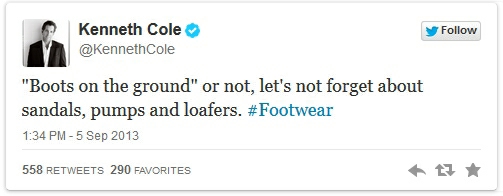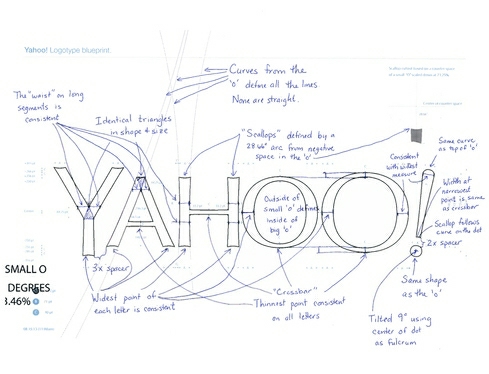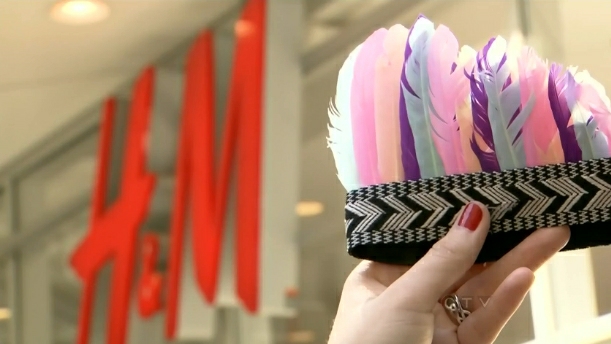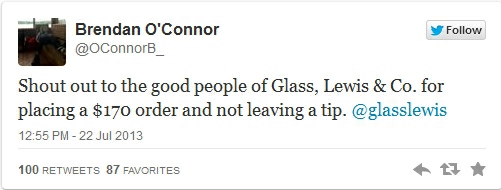Is Kenneth Cole Trolling?
How is it possible for Kenneth Cole to write yet another offensive tweet capitalizing on an international conflict? This time, the apparel designer is making no apologies.
In 2011, Cole used the hashtag #Cairo during the Egyptian uprisings:
Cole apologized for that tweet, and Ad Age did a fun summary of events (which I converted into a PowerPoint presentation), showing how quickly the hoopla emerged-and passed.
This time, Cole chose the controversy about Syria to hook into. "Boots on the ground" is a common reference to whether the United States will proceed with a military strike on Syria.
Reactions on Twitter were swift and harsh, but Cole isn't sorry at all. He issued this statement to CNBC and posted a video to Instagram:
"For 30 years I have used my platform in provocative ways to encourage a healthy dialogue about important issues, including HIV/AIDS, war, and homelessness. I'm well aware of the risks that come with this approach, and if this encourages further awareness and discussion about critical issues then all-the-better."
Discussion Starters:
- Did Kenneth Cole do as he says and purposely promote "a healthy dialogue"? Did he forget? Is he insensitive? Too proud to apologize a second time? Or, as some suspect, was he trolling?
- What's your view of Cole's statement and video? What do you make of his creating a video in this situation?
- This is Cole's Twitter description: "Designer, Aspiring Humanitarian, Frustrated Activist, Social Networker In Training." Should he change it?
KitKat 4.4: "Confectionery Perfectionery"
Google's new operating system for the Android will be called KitKat, and the chocolate company is having fun with the partnership.
On a new website, KitKat touts benefits of the chocolate bar. Here are a few examples:
- Hardware: As famous for its inside as its outside.
- Adjustable orientation. Works perfectly in portrait or landscape for a panoramic taste experience.
- Mobile: With global coverage, you can take it literally anywhere. Even to work.
Google is also promoting the partnership:
"Yep, our upcoming release will be named Android KitKat!
"KitKat has been a favorite candy on the team for some time, so for the K release, we asked if they'd be willing to lend their iconic candy bar to its name. Be on the lookout for limited edition Android KitKat bars coming soon to a candy aisle near you. For a lucky few, your KitKat bar might contain a winning ticket for a new Nexus 7 tablet or Google Play credits. Check it out."
Discussion Starters:
- What are the potential risks of the Google/KitKat partnership and how the companies are promoting it?
- What other examples do you recall of companies using humor in similar ways?
Yahoo's New Logo
For the first time in 18 years, Yahoo has a new logo-still purple and still sporting that question mark I never know whether I should include in writing. (I recently dropped it, following The New York Times' practice.)
In this video, you'll see many logo variations that the company considered.
In a blog post, CEO Marissa Mayer described the redesign process:
"So, one weekend this summer, I rolled up my sleeves and dove into the trenches with our logo design team: Bob Stohrer, Marc DeBartolomeis, Russ Khaydarov, and our intern Max Ma. We spent the majority of Saturday and Sunday designing the logo from start to finish, and we had a ton of fun weighing every minute detail.
"We knew we wanted a logo that reflected Yahoo - whimsical, yet sophisticated. Modern and fresh, with a nod to our history. Having a human touch, personal. Proud."
Sounds like fun. But the changes are subtle, rather than dramatic.
Discussion Starters:
- Compare the new logo to the old one. What differences do you notice, and what significance do they hold?
- Read Mayer's summary of the decisions made. Did you catch all of the changes and see the significance of each?
When Execs Send Less Email, Employees Do Too
 A new study shows one sure way to reduce corporate email: "start at the top."
A new study shows one sure way to reduce corporate email: "start at the top."
The seven-person management team at International Power in London saw their own influence on the number of emails sent within the organization. Sending an average of 56 emails a day, this group is actually below most middle managers in the United States. Still, the managers were surprised at this number and agreed to take steps to reduce the number of emails they sent.
According to an HBR article, executives participated in a process for reducing their emails:
"Despite a few misgivings (some felt the intervention intruded on their personal style), the executives underwent training to reduce their e-mail output by taking more-deliberate actions: not forwarding messages unless strictly necessary, limiting messages' recipients, and choosing the form of communication that would most efficiently accomplish the task at hand. In a phone call, for example, vocal tone provides real-time feedback on whether a message is being understood-something that's missing in the low-bandwidth e-mail channel. Facial expressions and body language make in-person meetings an even richer method of communication."
I was skeptical about this study, wondering how sustainable the results would be. An email reduction within a few months is easy to attain, but what about the long-term? However, the authors report email reductions lasting an impressive two years:
"Within three months the team's total e-mail output dropped by 54%. The output of the 73 other London-based employees soon began decreasing too, even though those employees received no training or feedback. In fact, this drop was even greater-64%. The result was an annual gain of 10,400 man-hours, which translates to a 7% increase in productivity. The new practices soon became embedded in the top team's behavior, and the reductions have been sustained for two years."
HBR published this "interactive," showing the number of emails that could be reduced when executives send fewer emails. Sorry, this does nothing for me. How about a simple chart instead?
Discussion Starters:
- To what do you attribute these results in email reduction throughout the organization?
- This study took place at a British energy company. Do you think the results may be different in the United States or at a company in a different industry? Why or why not?
- What's your assessment of HBR's "interactive"? Am I too harsh in saying that it doesn't add value to the survey results?
Chobani Apologizes for Moldy Yogurt

Chobani's CEO and Founder Hamdi Ulukaya is personally apologizing for selling moldy yogurt produced in its Idaho facility.
In a letter on the Chobani website, Ulukaya opens with, "I'm sorry we let you down.
"From the workers in our factories to our sales teams on the road, there is nothing we take greater pride in than making a perfect cup of yogurt."
Chobani also communicated updates through a press release and its Facebook page. The company's communication has been generally web received, as shown in these two Facebook posts:
However, several customers said it had been "weeks" since they reported the bad product on Chobani's Facebook page, but the company responded only recently.
Also, I doubt I'm the only one who finds the CEO's large, sad-looking photo a bit odd.
Discussion Starters:
- Compare Chobani's communications: press release, letter, and Facebook post. How did the company adapt the message to different audiences and media?
- What works well about the CEO's letter, and what could be improved?
Organizations and Fast-Food Companies Respond to Workers' Strike
On Thursday, fast-food workers went on strike demanding higher wages. In response, affected organizations and companies have issued statements.
A statement on the National Restaurant Association website emphasized fast-food restaurants as a training ground (Scott DeFife is the association's executive vice president of policy and government affairs):
"One of every three Americans gets his or her first job in the restaurant industry," he said. "People learn a strong work ethic and invaluable skills that help them for a lifetime. They learn about personal responsibility, teamwork, discipline and accountability.
"Restaurants are the cornerstones of our communities," DeFife said. "The jobs they provide often are the first step toward the restaurant industry's employees achieving great business success."
McDonald's response followed a similar line of reasoning: "Our history is full of examples of individuals who worked their first job with McDonald's and went on to successful careers both within and outside of McDonald's." The Chicago Tribune and other new agencies report that Wendy's, Burger King, and Yum Brands didn't respond to requests for comments.
According to WSBTV, McDonald's also said in a statement that raising entry-level wages would mean higher overall costs, which could result in higher prices on menus. In turn, "That would potentially have a negative impact on employment and business growth in our restaurants, as well as value for our customers."
According to USA Today, a representative from the National Retail Federation said, "Today's publicity stunt is just further proof that the labor movement is not only facing depleted membership rolls, they have abdicated their role in an honest and rational discussion about the American workforce."
The Employment Policies Institute, a conservative group, ran a full-page ad in The Wall Street Journal, showing a robot making pancakes. The group warns that workers' demands for higher wages will cause "fewer entry-level jobs and more automated alternatives."
Discussion Starters:
- Conduct your own research about fast-food workers' wages. What sources do you find most credible?
- What are your own conclusions about the situation? Should fast-food companies pay higher wages?
Microsoft Apologizes for Outlook Outage
An email outage that left some users without email for several hours warranted an apology-and Microsoft issued an effective one. A version on its website unfortunately lacks paragraph breaks, but this easier-to-read statement appeared elsewhere:
We want to apologize to our customers who were affected by the outage on Outlook.com this week. We have restored access to all accounts and have made changes so that the service will be more resilient in the future. We realize that we have a responsibility to the customers who use our services to communicate and share with the people they care most about, and we apologize for letting those customers down this week.
Our first priority is to the health of the services, and we will learn from this incident and work to improve the experience of all our customers. As part of that, we would also like to provide more detail about what happened.
This incident was a result of a failure in a caching service that interfaces with devices using Exchange ActiveSync, including most smart phones. The failure caused these devices to receive an error and continuously try to connect to our service. This resulted in a flood of traffic that our services did not handle properly, with the effect that some customers were unable to access their Outlook.com email and unable to share their SkyDrive files via email.
In order to stabilize the overall email service, we temporarily blocked access via Exchange ActiveSync. This allowed us to restore access to Outlook.com via the web and restore the sharing features of SkyDrive. These parts of the service were fully stabilized within a few hours of the initial incident. A significant backlog of Exchange ActiveSync requests accumulated as we worked to stabilize access. To avoid another flood of traffic, we needed to restore access to Exchange ActiveSync slowly, which meant that some customers remained impacted for a longer period of time.
We have learned from this incident, and have made two key changes to harden our systems against future failure – one that involved increasing network bandwidth in the affected part of the system, and one that involved changing the way error handling is done for devices using Exchange ActiveSync. We will continue to monitor the system and make additional changes as needed to keep the service healthy.
We are now fully through the backlog and have restored service so all customers should have normal access from all of their devices. We want to apologize to everyone who was affected by the outage, and we appreciate the patience you have shown us as we worked through the issues.
Dick Craddock, group program manager for Outlook also posted this message on Facebook and sent an email to users:
On behalf of the entire Outlook.com team, I would like to extend my personal apology for any inconvenience you may have experienced last week with access to Outlook.com.
We realize how critical your email is for staying in touch with your personal network and for being productive with the things you need to get done. And we are truly sorry for any issues you had in accessing Outlook.com. We want you to know that Outlook.com has earned a leading reputation as a reliable and trustworthy email experience and to that end, we deeply investigate any issue to ensure that we fully understand the root cause and can prevent a similar occurrence in the future. And we pledge to you that we are dedicated to providing the reliable and trustworthy mail experience that you expect.
Many of you have asked and we would also like to provide a more detailed explanation of what happened last week that caused some of you to be temporarily unable to access your email. This incident was caused by a failure for some of our servers in the functionality that syncs information on some mobile devices using Exchange ActiveSync. The failure caused these devices to receive an error and continuously retry connecting with our service. This resulted in a flood of traffic that some of our servers did not handle properly, with the effect that many customers on those servers were unable to access their Outlook.com email.
In order to stabilize the impacted servers, we temporarily blocked access over Exchange ActiveSync for all of those servers and then worked to restore this gradually. Because of the significant backlog of traffic that had accumulated and in order to avoid another flood of traffic, we restored access slowly, meaning some of our mobile customers remained impacted for a longer period of time.
We have learned from this incident, and have made two key changes to harden our systems against future failure – the most important is in updating the way we handle Exchange ActiveSync traffic to avoid a flood of requests hitting our servers and to ensure more reliable connections and the second involves increasing network bandwidth in the affected part of the system to ensure we have a greater capacity for these requests.
It is our goal to provide exceptional service to every person using Outlook.com, and I hope you will give us an opportunity to restore your confidence in Outlook.com. Your support and dedication to our email service is very important to us. And so once again, on behalf of the entire Outlook.com team, I want to apologize for any inconvenience you experience and want to thank you for any patience you have shown us as we worked through the issues.
We look forward to your continued Outlook.com usage and hope to have the privilege of being your primary personal email service in the future.
space
Sincerely,
Dick Craddock
Group Program Manager, Outlook.com
Discussion Starters:
- Compare the two messages. What are the similarities and differences? How do you account for each?
- What examples of logical arguments, emotional appeal, and credibility do you find in these examples?
- How do you assess the parts of the statements that explain what happened? Do you find them easy to understand for someone who isn't technical? Could the explanations be improved in some way?
- Do you find the apology sincere? What works well-or doesn't?
Reflections on MLK's "I Have a Dream" Speech
The news and websites have an abundance of reflections on Dr. Martin Luther King's infamous "I Have a Dream" speech, delivered 50 years ago, on August 28, 1963.
- PR Daily identified five "lessons for speechwriters":
- Emphasize phrases by repeating at the beginning of sentences
- Repeat key "theme" words throughout your speech
- Utilize appropriate quotations or allusions
- Use specific examples to "ground" your arguments
- Use metaphors to highlight contrasting concepts
- The New York Times "Critic's Notebook" column explored "The Lasting Power of Dr. King's Dream Speech." Part of the article summarized the power this way:
Why does Dr. King's "Dream" speech exert such a potent hold on people around the world and across the generations? Part of its resonance resides in Dr. King's moral imagination. Part of it resides in his masterly oratory and gift for connecting with his audience - be they on the Mall that day in the sun or watching the speech on television or, decades later, viewing it online. And part of it resides in his ability, developed over a lifetime, to convey the urgency of his arguments through language richly layered with biblical and historical meanings.
- Marketplace espeakers created this infographic:
Poor Spelling and Grammar Top List of Dislikes of Brands on Social Media
Disruptive Communications asked 1,000 UK consumers what they find most likely to damage a brand on social media. The winning response was "poor spelling or grammar."
 Perhaps this is an inevitable trade-off of brands becoming more personal on social media. With a natural, conversational voice may come some sloppiness. But, at least according to this survey, brands shouldn't become too sloppy, or they risk their brand's reputation.
Perhaps this is an inevitable trade-off of brands becoming more personal on social media. With a natural, conversational voice may come some sloppiness. But, at least according to this survey, brands shouldn't become too sloppy, or they risk their brand's reputation.
Surprisingly (or maybe not), respondents between 18 and 24 weren't as concerned about grammar and spelling. Instead, their biggest complaint was "does not post updates often enough," at the bottom of the list for other age groups. Maybe this is because the younger age group checks brands' posts more frequently?
Brands have a tough balance to strike: 13% of respondents said they "post updates too often." A similar percentage said brands tried "too hard to be funny," and "salesy" updates were the second biggest frustration of respondents, particularly for those between 45 and 54 years of age. Clearly, brands can't overdo it on social media, either.
Discussion Starters:
- How would you have responded to the survey? To what extent do you agree with the responses?
- This is a UK survey. Do you think the results might have been different in the US?
- Follow a brand on Twitter and Facebook for a few days. How do its posts match these survey results?
I "Literally" Can't Stand This Definition
We all succumb to grammatical sloppiness from time to time. I, for example, regularly split infinitives and end sentences in prepositions. But one error I cannot abide is using "literally" to mean exactly the opposite.
Apparently, I am the outlier. Following Merriam-Webster, Cambridge, and an appalling list of others, Google is the latest to add a new definition for "literally":
Merriam-Webster includes the definition, "in effect: virtually," with this discussion:
"Since some people take sense 2 to be the opposite of sense 1, it has been frequently criticized as a misuse. Instead, the use is pure hyperbole intended to gain emphasis, but it often appears in contexts where no additional emphasis is necessary."
MediaBistro lists other sources that have evolved their definitions, for example, Oxford:
"Oxford Dictionaries begrudgingly admitted the shift: 'In recent years an extended use of literally (and also literal) has become very common, where literally (or literal) is used deliberately in non-literal contexts, for added effect, as in they bought the car and literally ran it into the ground. This use can lead to unintentional humorous effects (we were literally killing ourselves laughing) and is not acceptable in formal contexts, though it is widespread.'"
Cambridge, which refers to an "informal" use: "used to emphasize what you are saying."
Sellouts, all!
Parks and Recreation fans: here's a compilation of Chris Traeger (Rob Lowe) saying "literally":
Discussion Starters:
- What's your view? Should we accept the evolving definition or literally fight it to the death?
- What other words are misused and considered acceptable in some circles?
Ashton Kutcher's Teen Choice Award Speech
Natural, self-deprecating, and personal, Ashton Kutcher's speech at the Teen Choice Awards is winning critical acclaim. Kutcher dressed casually and took a casual approach to his speech, as he accepted the award for his portrayal of Steve Jobs in the new movie, "Jobs." Observers say he was channeling the Apple founder's presentation style.
Starting by saying, "This is the old guy award. This is like the grandpa award," Kutcher endeared himself to the audience of screaming teens. (He's 35 years old.) He then revealed something personal: "I feel like a fraud. My name is actually not even Ashton. Ashton is my middle name. My first name's Chris." (Cue audience cheers.)
As of this writing, the video on YouTube garnered nearly 3 million views.
Discussion Starters:
- Does Kutcher's speech deserve the attention it is getting? Why or why not?
- What is appropriate about his speech for the teenage audience? What, if anything, feels out of place?
H&M Didn't Learn the Headdress Lesson from Victoria's Secret
How many more retailers will make this mistake? H&M Canadian customers were offended by hair accessories that imitated Native American headdresses with fake feathers.
Kim Wheeler, an Ojibwa-Mohawk woman, complained to H&M after seeing the headdress in a Vancouver, B.C., store. She told CTV,
"They're worn by chiefs. They're a sign of honour and respect and leadership. They're not a cute accessory to be worn in a nightclub. It's not something you take lightly and throw on your head and wear to the bar or a concert."
H&M issued this statement:
"We always want to listen to our customers and their feedback, our intention was never to offend anyone or to be insensitive. We chose to remove the headdress inspired accessory from our shelves. This was a limited edition item that was sold in 5 of the 62 locations we operate in Canada."
CTV reports that H&M pulled the headdress after hearing three complaints; however, they have not commented on whether they are removing the accessory from stores in other countries.
Victoria's Secret made a similar mistake recently when the company outfitted a model in Native American-style headdress, leopard-print underwear, turquoise jewelry, and high heels.
Discussion Starters:
- What's your view of the situation? Did H&M do the right thing, did the customer overreact, or something else?
- Compare this situation to that of Victoria's Secret. What are the similarities and differences in the use of the headdress and how the companies responded?
Oprah Vs. Sales Assistant: Racist or Misunderstanding?
 We'll never know what really happened in a luxury boutique in Switzerland when Oprah was visiting for Tina Turner's wedding. She accused a sales assistant of not showing her a £25,000 handbag because of her race, but the assistant denies the claim.
We'll never know what really happened in a luxury boutique in Switzerland when Oprah was visiting for Tina Turner's wedding. She accused a sales assistant of not showing her a £25,000 handbag because of her race, but the assistant denies the claim.
On "Entertainment Tonight," Oprah explains what happened: she asked the assistant to see a particular bag, and the woman said, "No, it's too expensive." Oprah says that she asked repeatedly to see the bag, but the assistant "refused to get it."
The sales assistant gave her perspective on the interaction:
"I wasn't sure what I should present to her when she came in on the afternoon of Saturday July 20 so I showed her some bags from the Jennifer Aniston collection.
"I explained to her the bags came in different sizes and materials, like I always do.
"She looked at a frame behind me. Far above there was the 35,000 Swiss franc crocodile leather bag.
"I simply told her that it was like the one I held in my hand, only much more expensive, and that I could show her similar bags.
"It is absolutely not true that I declined to show her the bag on racist grounds. I even asked her if she wanted to look at the bag."
She also said that if she spoke to Oprah, she "would apologize and say it was all a misunderstanding. I surely did not intentionally want to insult Ms. Winfrey. I hope this nightmare ends soon."
At the premier of her new movie, Oprah told reporters, "I'm really sorry that it got blown up. I purposefully did not mention the name of the store. I'm sorry that I said it was Switzerland."
She also said, "It's not an indictment against the country or even that store," Winfrey explained. "It was just one person who didn't want to offer me the opportunity to see the bag, so no apologies necessary from the country of Switzerland."
Discussion Starters:
- What's your view of what happened in the store?
- Is it possible that both perspectives are, in some way, accurate? How so?
AOL CEO Fires Employee During a Conference Call
Tim Armstrong, AOL CEO, may have acted impulsively during a conference call when he terminated an employee on the spot. Frustrated with Patch, a division of AOL that hosts websites with local news and information, Armstrong was explaining the future of Patch to about 1,000 employees. Part of the plan is to reduce the number of sites from 900 to 600.
At about 2:00 into this clip, Armstrong tells Abel Lenz, Patch's creative director, to "put that camera down." Apparently, Lenz regularly recorded meetings and posted pictures on AOL's intranet. Then Armstrong said, "Abel, you're fired. Out." After a few seconds of silence, Armstrong continued, "If you guys think that AOL has not been committed to Patch, and won't stay committed to Patch, you're wrong. The company has spent hundreds of millions of dollars, the board of directors is committed, I'm committed...."
According to sources, the call lasted one hour and forty minutes; it's unclear at what point during the call this segment took place.
SFGate explains Armstrong's position:
"A few minutes later, Armstrong complained about leaks to the media. He said the leaks were making Patch seem like 'loser-ville' in the press.
"He said, 'That's why Abel was fired. We can't have people that are in the locker room giving the game plan away.'"
Lenz has been quiet about the incident. He gave a "No comment" response to PR Daily and told Jim Romenesko, "I appreciate the interest, Jim, but I have nothing to share. Go Patch!"
Two days later, Armstrong sent this email to all AOL staff:
AOLers -
I am writing you to acknowledge the mistake I made last Friday during the Patch all-hands meeting when I publicly fired Abel Lenz. It was an emotional response at the start of a difficult discussion dealing with many people's careers and livelihoods. I am the CEO and leader of the organization, and I take that responsibility seriously. We talk a lot about accountability and I am accountable for the way I handled the situation, and at a human level it was unfair to Abel. I've communicated to him directly and apologized for the way the matter was handled at the meeting.
My action was driven by the desire to openly communicate with over a thousand Patch employees across the US. The meeting on Friday was the second all-hands we had run that week and people came to Friday's meeting knowing we would be openly discussing some of the potential changes needed at Patch. As you know, I am a firm believer in open meetings, open Q&A, and this level of transparency requires trust across AOL. Internal meetings of a confidential nature should not be filmed or recorded so that our employees can feel free to discuss all topics openly. Abel had been told previously not to record a confidential meeting, and he repeated that behavior on Friday, which drove my actions.
We have been through many difficult situations in turning around AOL and I have done my best to make the best decisions in the long-term interest of the employees and the company. On Friday I acted too quickly and I learned a tremendous lesson and I wanted you to hear that directly from me.
We have tough decisions and work to do on Patch, but we're doing them thoughtfully and as openly as we can. At AOL, we had strong earnings last week and we're adding one of the best companies in the world to the team. AOL is in a great position, and we'll keep moving forward.
Discussion Starters:
- Defend Armstrong's actions. What else could be happening at the company to justify the firing?
- What are the potential dangers of an employee intranet site, where news and other company information is shared among employees?
- How do you asssess Armstrong's email to staff? What works well, and what could be improved?
Fast-Food Workers Strike over Pay
The fast-food industry has been under fire for paying low wages. The website "Fast Food Forward," asks people to sign a petition:
"We can't survive on $7.25!
"In America, people who work hard should be able to afford basic necessities like groceries, rent, childcare and transportation.
"While fast food corporations reap the benefits of record profits, workers are barely getting by-many are forced to be on public assistance despite having a job.
"Raising pay for fast food workers will benefit workers and strengthen the overall economy."
 In July, McDonald's mistakenly publishing Practical Money Skills, a budgeting journal for employees. It was a nice idea, but the tool has made obvious that employees have a tough time living on McDonald's wages alone. A Mother Jones article criticized the advice:
In July, McDonald's mistakenly publishing Practical Money Skills, a budgeting journal for employees. It was a nice idea, but the tool has made obvious that employees have a tough time living on McDonald's wages alone. A Mother Jones article criticized the advice:
"The most practical tip: In order to obtain a living wage working at McDonald's 35 hours per week (monthly income: $1,105), get a second job. Least practical facet: as MSNBC's Maria Perez notes, it "leaves out necessary expenditures like food, child care, clothes and gas."
Another Mother Jones writer asks that we "give McDonald's a break." The row for "Income (2nd job)" assumes a dual-income family with two working adults.
A New York Times opinion from The Executive Board explains how the minimum wage has lagged behind inflation:
"As measured by the federal minimum wage, currently $7.25 an hour, low-paid work in America is lower paid today than at any time in modern memory. If the minimum wage had kept pace with inflation or average wages over the past nearly 50 years, it would be about $10 an hour; if it had kept pace with the growth in average labor productivity, it would be about $17 an hour."
Fast-food employees are paid $9, on average.
The New York Times piece also critcizes executive pay:
"At some point, as strikes continue, well-paid executives in low-wage industries will have to confront the fact that low worker pay is at odds with their companies' upbeat corporate images and their self-images as top executives. (The chief executives of McDonald's and Yum Brands, which owns Taco Bell, Pizza Hut and KFC, are among the nation's highest-paid corporate leaders.)"
An International Business Times infographic summarizes some of the data well:
A Bloomberg Businessweek article reported that wage increases will hurt already low fast-food margins. Profit margins are particularly slim for franchised restaurants, which set their own pay rates. The article compares company-owned Burger Kings, which can garner margins of over 10%, to a franchised store, which may operate at only 2%. For franchisees, the cost of higher wages may not easily be offset by raising menu prices. However, the writer concedes,
"Much of the public debate, however, is focused on raising wages to considerably less than the much-hyped $15 an hour. Wicks-Lim and 99 other economists signed a petition in July to raise the federal minimum wage to $10.50. They say the increase in costs for restaurants would equal about 2.7 percent of sales. Wicks-Lim adds that companies could then make up the difference through price increases (say, a nickel more for a burger), reduced employee turnover, productivity gains, and slower raises for the highest-paid employees."
Discussion Starters:
- Find research to support both sides of the issue. What credible sources do you find? What are the major arguments on each side?
- What examples of fallacies do you find in the arguments?
- What's your view? Should fast-food restaurants pay more? How much?
Study Finds "Likes" Could Encourage Positive Decisions
A study in the Science journal found that when people liked an article, others are 32% more likely to approve of the article. Published as "Social Influence Bias: A Randomized Experiment," the study looked at data from 100,000 articles from a web site that aggregates social news. Web site administrators randomly assigned initial positive and negative ratings, which caused a "herding effect"-in this case, "jumping on the bandwagon" with positive reviews, although writing and reporting in that article were not necessarily any better than in any other articles.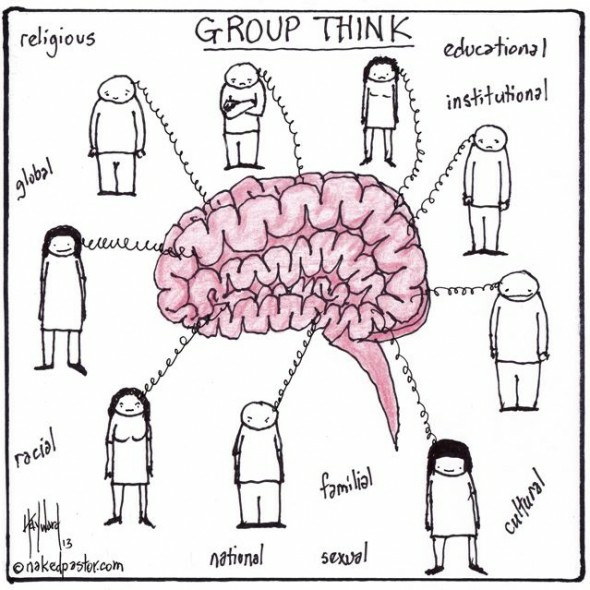
However, the study found, surprisingly, that the opposite didn't hold true; rather, when people disliked an article, others commented to correct the initial review. In other words, people defended articles with initial negative comments.
A New York Times article about the story describes the effect:
"The first person reading the comment was 32 percent more likely to give it an up vote if it had been already given a fake positive score. There was no change in the likelihood of subsequent negative votes. Over time, the comments with the artificial initial up vote ended with scores 25 percent higher than those in the control group."
The authors warn of social biases in many types of decision making.
Discussion Starters:
- In what ways do you see evidence of this study in your own experience on social networking sites or ratings sites?
- What implications from this study can you see for how TripAdvisor works? What are the potential dangers of the herding effect?
Food Truck Employee Gets Fired for a Tweet
Unhappy about not receiving a tip, a food truck employee let loose on Twitter:
Employees at Glass Lewis & Company, a consultancy specializing in corporate governance, ordered $170 worth of grilled cheese sandwiches and milkshakes but didn't leave a tip. Brendan O'Connor, the Milk Truck employee, chronicled the incident on his blog:
"I was making sandwiches, another worker took the order and a third made the milkshakes and watched the grills. A line grew while we worked, and we had to tell other customers that their lunch orders would take longer than usual. They paid; I asked my co-worker who was dealing with the money how much of a tip they'd left. They had left actually no tip at all. (They had paid with a card so we checked the cash tips to see if there'd been a bump. There hadn't.)
"I asked some of the group as they were picking up their orders if they had intended to not tip. They hemmed and hawed and walked away.
"Well. I could have not said anything. I could have made it a subtweet. I probably should have made it a subtweet. But I didn't, because of some misguided notions about having 'the courage of your convictions,' or whatever."
O'Connor explains that he was fired by the owner after someone from Glass Lewis complained about being "tip-shamed." O'Connor's argument is that his employer uses social media feedback to monitor employees' performance, so why shouldn't he use social media to "advocate for a more civil exchange between worker and consumer?"
Well, no companies want their customers embarrassed publicly, and many have policies in place to this effect. Milk Truck managed to restore its credibility with an apology tweet, accepted by Glass Lewis:

But Twitter is still abuzz with the ethics of the situation. Did Milk Truck do the right thing by terminating O'Connor? Was O'Connor's tweet justified? Does Glass Lewis owe an apology? What's your view?
Mercedes Removes Weird "Service Song" Video
AdWeek called Mercedes-Benz's "Service Song" video "Weird, Cheesy, Suggestive, and Embarrassing." The video here is a bootleg copy; the company has removed the official version after enough ridicule. (Download Mercedes Service Song.)
The beginning lyrics follow:
"I like them to be strong, that they can catch me when I skid/Like them to turn me on, I thought that some of them did/But just as I needed a helping hand, so many men were 'out of service,' not like you … You only give your best, won't stop until I smile."
AdWeek argues that the video is "downmarket" for the luxury brand. It does seem kitschy: the hokey images, 1980s-style song (although catchy!)...
The AdWeek writer's prediction came to pass: "I give it a week before it's gone from YouTube."
Discussion Starters:
- What's your assessment of the Service Song video? Do you agree with AdWeek's perspective?
- Did the company do the right thing by taking down the video? What are the arguments for and against this move?
Texas Six Flags Responds to Woman's Death
A woman died on The Texas Giant, a roller coaster at Six Flags Over Texas in Arlington, and the company has responded. Rosa Ayala-Goana's lap bar either broke or came loose, and she fell to her death. Witnesses describe a terrible scene, with her son, who was at her side, screaming for help.
Six Flags representative Sharon Parker issued this statement and tweeted an apology:
"We are deeply saddened to share that earlier this evening an adult woman died in the park while on the Texas Giant. Park medical staff and local paramedics responded immediately. Since the safety of our guests and employees is our number one priority, the ride has been closed pending further investigation. Our thoughts and prayers are with the family and friends during this difficult time."

The next day, Six Flags issued another statement:
"We are committed to determining the cause of this tragic accident and will utilize every resource throughout this process. It would be a disservice to the family to speculate regarding what transpired. When we have new information to provide, we will do so. Our thoughts, prayers and full support remain with the family."
The Texas Giant is the world's tallest steel-hybrid roller coaster. According to a local CBS news agency, 14 injuries on the roller coaster have been reported since 2008, but most were minor.
Discussion Starters:
- Assess the two statements issued by Six Flags. What works well, and what, if anything, can be improved?
- Rewrite both statements, using your own words and perhaps more natural word choices. Share your drafts with a partner to compare each.
Panera Apologizes to Farmers
Panera's campaign to tout the benefits of its chicken inadvertently offended an important, vocal group: farmers. Panera posted a video and started the Twitter hashtag #EZChicken to promote its chicken, which is produced without antibiotics.
The description on YouTube transcribes the video:
"At Panera, we decided a long time ago to avoid the easy road and switch to Antibiotic-free chicken. That decision set a lot of things in motion, so now it's not just chickens raised this way, it is more ingredients you can trust, which has taught us a lesson. Sometimes, what you think is the harder road, turns out to be the only one worth being on. Panera Bread. Live Consciously, Eat Deliciously."
Dairy Carrie, a farmer with an active blog, chronicled Panera's campaign, including several memes showing chickens as pills.
Farmers didn't appreciate Panera's implication that they take the easy way out. Dairy Carries writes on her blog,
"But wait you say, Panera isn't calling all farmers and ranchers lazy! They are just calling the ones that use antibiotics lazy! I used antibiotics to help a sick calf get better last week, my friends the organic farmers had a cow with pneumonia and they gave that cow antibiotics to make her better. They had to sell her, but she lived. Does that mean we are lazy? Is it lazy to take care of our sick animals?"
A company representative did call Dairy Carrie, and a representative apologized to others on Twitter:
Discussion Starters:
- Explain the disconnect between Panera's promotion and farmers' perspective. Describe the view from each group.
- Should Panera have predicted this reaction from farmers? How so or why not? Should the company have avoided the campaign or have approached it in another way?



